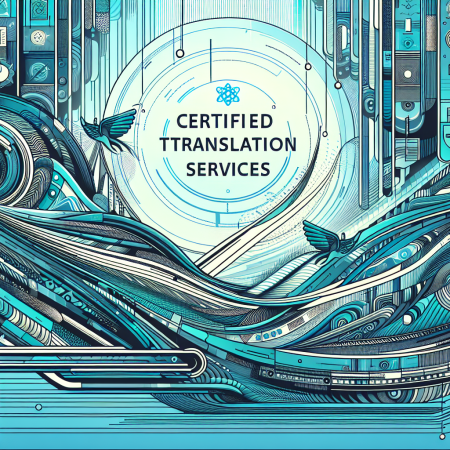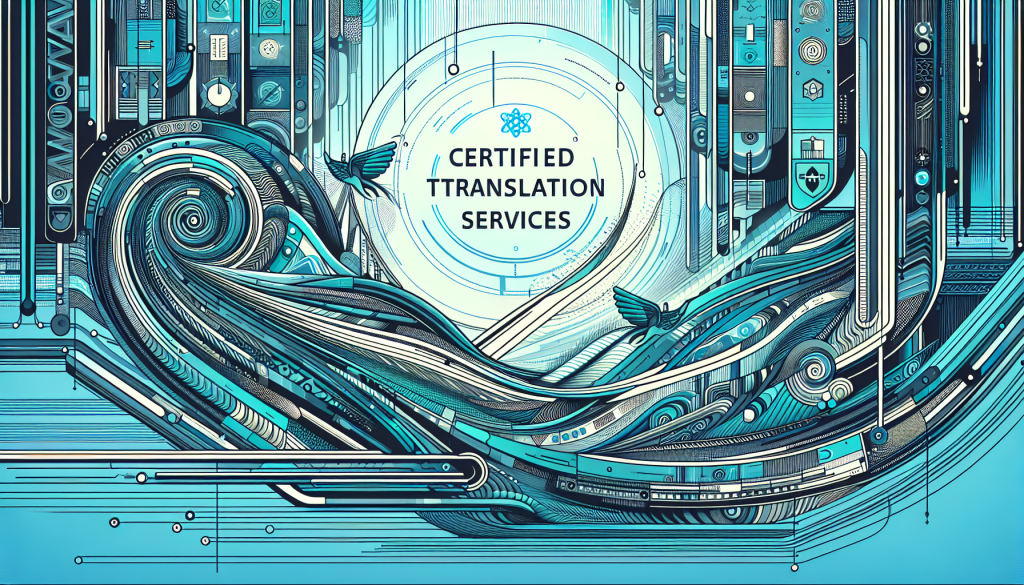Understanding Certified Translation Services
In a world where information transcends geographical and linguistic boundaries, translation services are increasingly vital. Among these, certified translation services offer a professional, precise, and legally recognized solution for translating official documents.
Definition and Importance
Certified translation refers to a meticulous word-for-word translation that includes certification for official use (ImmiTranslate). This service is performed by professional translators who are proficient in both the source and target languages and have expertise in the subject matter of the documents being translated. They provide a certification statement or a sworn statement, attesting to the accuracy and completeness of the translation (ILS Translations).
The importance of certified translation services is underscored by their legal value and necessity for official documents such as contracts, legal forms, and important correspondences. These services are often required by government agencies, courts, and educational institutions. Recognizing which documents necessitate certification is the first step towards accurate translations that uphold legal integrity.
Recognized Certifications
Certifications for translations are recognized when they are conducted by a professional certified translator. These translators are experienced in translating specific types of documents and are familiar with the cultural nuances and legal terminology of the target language.
The use of certified translation services is essential for legal and official documents that require accuracy and precision. This includes contracts, patents, immigration documents, and academic transcripts.
In addition to accuracy and quality, certified translation services provide an added level of security and confidentiality. This ensures that sensitive information in the documents is protected during the translation process.
Understanding the significance and role of certified translation services is key for individuals, businesses, and institutions that require translations for official use. In the following sections, we delve deeper into the types of certified translations, the process, how to choose services, and their benefits.
Types of Certified Translations
Certified translation services are instrumental across a range of sectors. Here are three primary categories where certified translations play a crucial role.
Business Translation
Business translation involves the professional translation of documents for business or personal use. This could range from company reports and financial statements to marketing materials and website content. Given the importance and potential impact of these documents, it's essential that translations are accurate, contextually correct and culturally relevant.
A certified translator provides an assurance of accuracy and quality, as these professionals are fluent in both the source and target languages and have subject matter expertise. The translations are usually accompanied by a certificate of accuracy, providing credibility and authenticity to the translated document.
Legal Document Translation
Legal document translation is another significant area where certified translation services are often required. This involves translating legal documents like contracts, court documents, immigration papers, marriage certificates, or birth certificates. These translations need to be accurate, as they are typically used by government agencies, courts, and educational institutions.
A certified translation can help avoid potential legal and financial consequences, as inaccurately or poorly translated documents can lead to misunderstandings, disputes, delays, and even legal penalties.
Medical Record Translation
Medical record translation is another field where certified translation services are highly sought after. These services are crucial for translating medical records, lab reports, patient information, and other health-related documents. Medical institutions, physicians, and patients who need to understand these documents in a different language often rely on medical translation services.
The complexity of medical terminology and the critical nature of these documents necessitate accurate translation. A certified translator with expertise in medical terminology ensures that the translation is accurate and the intended meaning is correctly conveyed.
In all these fields, certified translation services not only ensure the accuracy of the translated documents but also their acceptance by the relevant authorities. Whether it's a business proposal, a legal document, or a medical report, certified translation services play a crucial role in breaking down language barriers and facilitating communication.
Process of Certified Translation
The process of certified translation involves several crucial steps to ensure that the final document is accurate, complete, and legally valid. Here, we delve into the stages of translation, quality checks, certification, and notarization.
Translation and Quality Checks
The first step in the process involves translating the document from the source language into the target language. This is done by a professional certified translator fluent in both languages and has expertise in the subject matter of the documents being translated (ethix360).
The translation involves capturing the essence, tone, and legal intricacies of the original content. The translator combines linguistic expertise with legal understanding to produce accurate and contextually appropriate translations (LinkedIn).
Once the translation is complete, it undergoes quality checks to verify its accuracy and adherence to legal standards. Genuine certified translations involve verifying the accuracy of the translation and attesting to its authenticity. Quality checks are essential to ensure the translated document is flawless and adheres to legal standards (LinkedIn).
Certification and Notarization
After the translation is finalized and quality-checked, it moves on to the certification stage. A certified translation is a translation that is accompanied by a signed statement from the translator or translation company, certifying that the translation is accurate and complete to the best of their knowledge and ability (ATA).
The certification statement usually includes the translator's contact information, qualifications, and a statement of accuracy (ATA). This certification holds significant legal value and is required for documents such as contracts, legal forms, and important correspondences.
In some cases, notarization may also be necessary. A notarized translation is a professional certified translation with additional notarization for official use (ImmiTranslate). Notarization involves a notary public validating the identity of the person signing the certification statement, further affirming its authenticity.
With certified translation services, businesses, educational institutions, and individuals can ensure the accuracy and legality of their translated documents. Whether it's legal document translation, medical translation services, or website translation services, certified translations can provide peace of mind and legal acceptance.
Choosing Certified Translation Services
When it comes to selecting certified translation services, two primary factors need to be considered: credibility and confidentiality. Each of these elements plays a critical role in ensuring the accuracy and privacy of your translated documents.
Determining Credibility
The credibility of a translation service can greatly impact the quality and reliability of the translations provided. It's crucial to work with professional translators who have expertise in their specific domains. For instance, if you need a legal document translation, ensure that the translator has a background in legal translation. Similarly, for medical translation services, a translator with medical expertise would be the best fit.
A credible translation service should have a team of certified translators. A certified translator has passed rigorous examinations and met the professional standards set by national or international translation organizations. This certification guarantees their proficiency in both the source and target languages, as well as their ability to accurately and effectively translate various types of documents.
Quality assurance processes are another indicator of a translation service's credibility. Reliable agencies implement strict internal reviews and audits to ensure the highest translation standards are met. This ensures that the final translated document is not only accurate but also culturally appropriate and contextually correct.
Ensuring Confidentiality
Confidentiality is a critical aspect of any translation service, especially when dealing with sensitive documents such as legal or medical records. Translation agencies should prioritize the privacy and confidentiality of their clients' documents.
Non-Disclosure Agreements (NDAs) should be signed by translators and translation agencies to ensure the confidentiality of the documents being translated source. Legal documents should be transmitted and shared through secure channels to prevent unauthorized access or interception, utilizing encryption, password protection, and secure file transfer protocols source.
In addition, translation agencies should have secure storage systems in place to prevent unauthorized access to translated documents. These measures should include password protection, firewalls, and access control source.
By diligently assessing the credibility and confidentiality measures of a translation service, you can ensure that your documents are accurately translated and securely handled. Whether you need business, legal, or medical translation services, these considerations will help you select the most suitable and reliable certified translation services.
Benefits of Certified Translation Services
Utilizing certified translation services brings with it several significant benefits. These services not only provide accurate translations but also help maintain the integrity and legal validity of your documents. Let's delve further into how these services can be advantageous.
Legal Acceptance
Certified translations are generally accepted by government agencies, courts, and other official entities. This ensures that the translated documents maintain their legal validity and are recognized in the target country or jurisdiction. This holds significant importance for documents such as contracts, legal forms, and important correspondences. Recognizing which documents necessitate certification is the first step towards accurate translations that uphold legal integrity.
Certified translations are often required for a wide range of documents, including birth certificate translation, legal document translation, marriage certificate translation, and immigration document translation. Therefore, it's vital to choose a reliable certified translator to ensure the authenticity and acceptance of your translations.
Preventing Misinterpretations
Inaccurate or poorly translated documents can lead to misunderstandings, disputes, delays, and even legal penalties. Certified translations ensure that the intended meaning and legal implications of the original documents are accurately conveyed in the target language (ethix360).
Genuine certified translations involve verifying the accuracy of the translation and attesting to its authenticity. Quality checks are essential to ensure the translated document is flawless and adheres to legal standards (LinkedIn).
It's also essential to review the certified translation for accuracy and clarity before using it in legal matters. Translation partners should provide ongoing support and clarification to address any queries that arise (LinkedIn).
In conclusion, certified translation services play an integral role in ensuring the legal acceptance and accurate representation of documents. Whether for personal or professional use, these services provide peace of mind and prevent potential legal and financial consequences.
Certification Bodies for Translators
Selecting a certified translator can significantly enhance the accuracy and reliability of your translation needs. Two such reputable bodies offering recognized certifications to translators are the American Translators Association and the International Medical Interpreters Association.
American Translators Association
The American Translators Association (ATA) provides a comprehensive certification examination for translators in various language combinations. This certification is widely recognized and respected in the translation industry.
The certification process requires candidates to pass a rigorous three-hour examination that consists of multiple-choice questions, a passage to be translated, and a commentary to be written. This thorough evaluation ensures that ATA-certified translators possess the necessary linguistic skills and knowledge to provide top-quality translation services.
Whether you require legal document translation, medical translation services, or even website translation services, an ATA-certified translator can provide the expertise and professionalism required.
International Medical Interpreters Association
For medical translations, the International Medical Interpreters Association (IMIA) offers a specific certification for medical interpreters. The IMIA certification validates the interpreter's skills and knowledge in medical terminology and ethics (Indeed).
Medical translations require a nuanced understanding of complex medical terms and an ability to translate these accurately. IMIA-certified translators are equipped to handle such intricate tasks, making them an excellent choice for medical document translation.
In addition to these, translators working in the localization industry may also find the Project Management Professional (PMP) certification offered by the Project Management Institute (PMI) beneficial.
By selecting a translator certified by these respected bodies, you can ensure that the translated documents adhere to high standards of accuracy and professionalism. It's an investment in quality that can save time, prevent miscommunication, and provide peace of mind.
Impact of Certified Translations
The role of certified translations extends beyond simple language conversion. They play a vital role in various aspects of business operations and legal proceedings. Let's delve into how these certified translation services influence these two domains.
Business Operations
In the realm of business, certified translations can make or break the communication flow, especially in international operations. Any misinterpretation or inaccurate translation of business documents like contracts, financial reports, or even website content can lead to miscommunication, potentially jeopardizing business relationships or even legal compliance.
Certified translation services ensure accuracy and quality in translating important documents. These services are provided by professional certified translators who are fluent in both the source and target languages and have expertise in the subject matter of the documents being translated. This proficiency in language and industry-specific knowledge guarantees the preservation of the original document's intent, tone, and context.
For example, website translation services can help businesses reach a wider audience by eliminating language barriers. Similarly, financial translation services ensure that complex financial terminologies and data are accurately translated, aiding in seamless international financial operations.
Legal Proceedings
Legal documents often require certified translations, especially when they are to be used in foreign legal proceedings or submitted to government agencies (ILS Translations). This can include a wide range of documents from legal document translation to marriage certificate translation or immigration document translation.
Certified translations hold significant legal value and are required for documents such as contracts, legal forms, and important correspondences. Recognizing which documents necessitate certification is the first step towards accurate translations that uphold legal integrity.
Genuine certified translations involve verifying the accuracy of the translation and attesting to its authenticity. Quality checks are essential to ensure the translated document is flawless and adheres to legal standards. This level of accuracy and authenticity is crucial in legal proceedings, where any misinterpretation can have serious implications.
In conclusion, certified translations play a significant role in both business operations and legal proceedings. They ensure the accurate and authentic translation of important documents, thereby facilitating smooth communication, ensuring legal compliance, and preventing potential misinterpretations.




![[Regulatory Update] Egypt Imposes New Certification Rules for Manual Translations [Regulatory Update] Egypt Imposes New Certification Rules for Manual Translations](https://maxsuntranslation.com/wp-content/uploads/2025/06/Egypt-Imposes-New-Certification-Rules-for-Manual-Translations-1-300x109.png)

